Media Room
Consumer Reports’ New Online EV & Hybrids Hub Helps Car Shoppers Compare the Most Fuel Efficient Models Side-By-Side
New user experience highlights CR’s independent ratings and reviews, EV benefits and tradeoffs, savings and tax incentives, and more
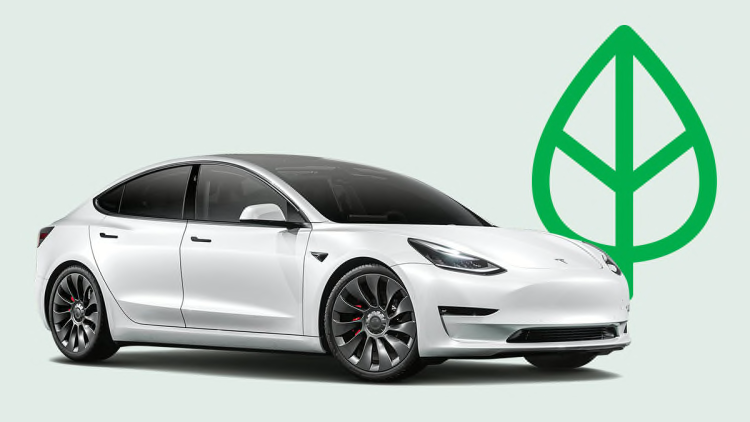
COLCHESTER, CT — Seventy-one percent of Americans have some level of interest in buying an electric vehicle (EV), according to a nationally-representative survey by Consumer Reports, the nonprofit research, testing, and advocacy organization. But there remains a lot of confusion about how these vehicles work, who they work best for, and if they’ll really save drivers money. To help better inform car shoppers, CR has launched a brand new EV & Hybrid vehicles hub on ConsumerReports.org.
“Consumers have so many options when buying a car today, but one thing is clear: Fuel economy is among the most important factors people tell us they’re considering for their next vehicle purchase,” said Lauren Stanich, senior vice president and chief membership officer at Consumer Reports. “Our new EV and Hybrids hub will provide consumers with the expert, unbiased data they need to make the best choice for their lifestyle.”
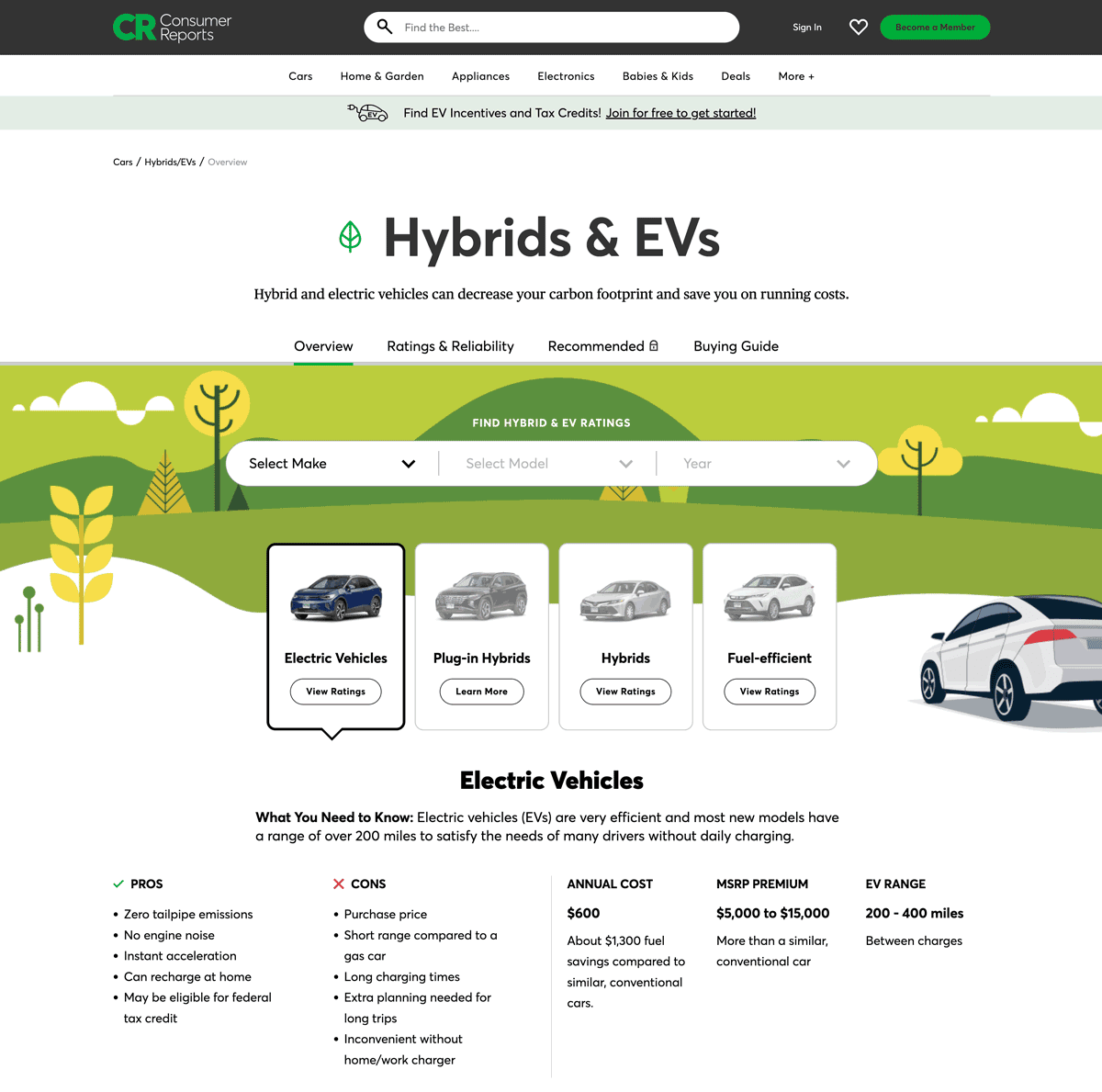
Whether it’s understanding which federal and state tax incentives are applicable, looking at the pros and cons of EVs, hybrids, plug-in hybrids, and the most fuel-efficient gas-powered cars, comparing each type side by side, or keeping up with the latest news, CR’s EVs & Hybrids hub is a one-stop source for unbiased information.
“There’s a lot to like about EVs. Not only do they have zero tailpipe emissions, but they can be quite enjoyable to drive as well,” said Jake Fisher, senior director of automotive testing at Consumer Reports. “But there’s a lot to consider for car shoppers when trying to determine if a pure EV makes the most sense, or if a fuel-efficient hybrid would be the best way to go.”
Will an EV save you money?
CR compared four popular EVs to evenly-matched gas-powered competitors to gauge how much each costs to drive 12,000 miles a year. Then, after accounting for tax credits, we compared overall costs in different states with varying energy costs. These comparisons demonstrate whether an EV could save money, and, if so, how long it would take to break even. EVs can also cost less to repair and maintain. A 2020 CR analysis found EVs can cut repair and maintenance costs by up to 50 percent over comparable gas cars, saving owners hundreds of dollars yearly.
Sports Sedan: BMW 330i xDrive ($52,995) vs Tesla Model 3 ($50,240 w/tax credit)
With a federal tax credit, an all-wheel-drive Model 3 could save buyers at least $2,755 compared to a BMW 3 series at the time of purchase, and those savings continue every time a driver plugs in, adding up to around $8,000 over a five-year period.
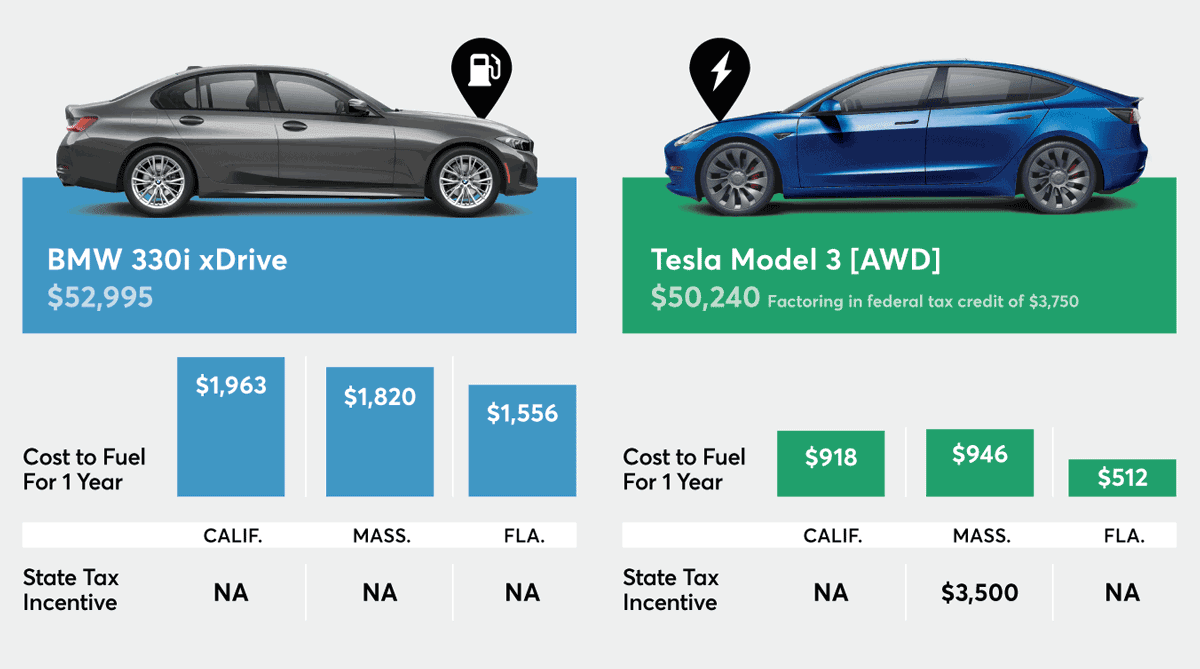
Small Cars: Toyota Corolla Hybrid ($25,145) vs Nissan Leaf SV Plus ($33,385 w/tax credit of $3,750)
The Tennessee-built Nissan Leaf SV Plus qualifies for at least $3,750 in federal tax credits and maybe state credits, too. But it costs so much more than a Corolla Hybrid up front that there’s no situation in which the Nissan EV makes up for its cost premium over the Toyota hybrid in tax and fuel savings alone. That’s largely because the Corolla Hybrid is so efficient, getting 48 mpg overall in CR’s tests. Note that in some states, it can actually cost more for the electricity to power the Leaf than the gasoline for the very fuel-efficient Corolla Hybrid.
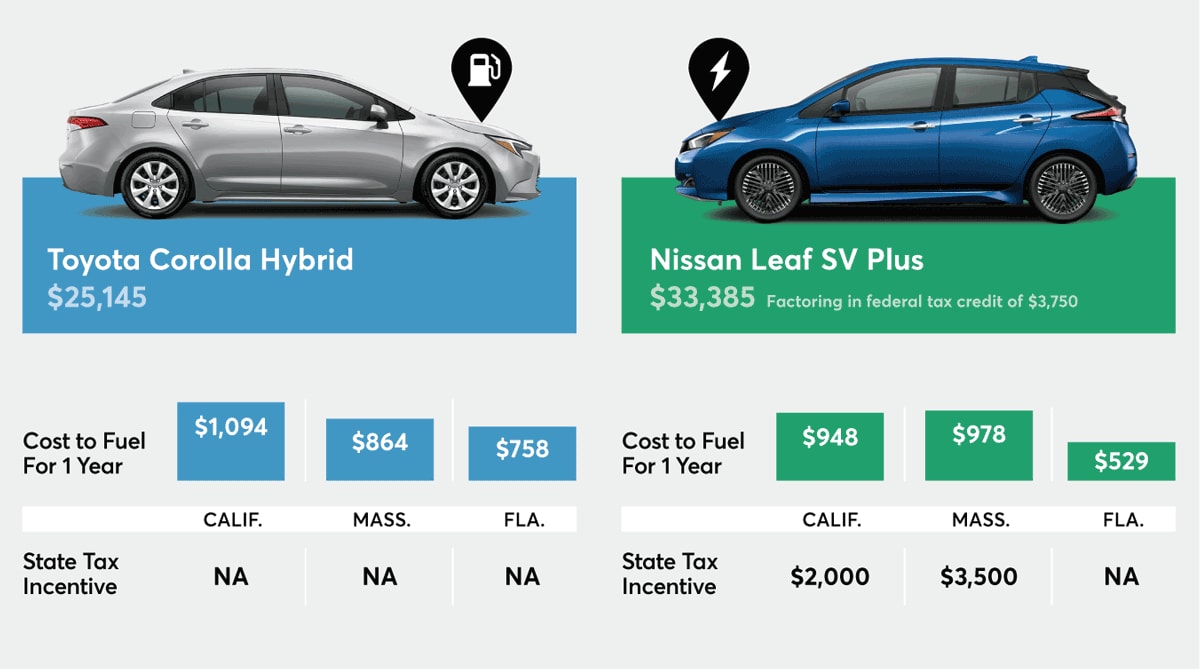
Small SUV: Hyundai Tucson Hybrid ($33,194) vs. Hyundai Ioniq 5 ($51,020)
Car buyers looking for a small SUV might want to opt for a hybrid instead of a pure EV. “Small SUVs are the heart of the market, but consumers don’t really have an affordable, reliable choice when it comes to buying an electric version,” says Fisher. The Ioniq 5 isn’t made in the U.S. so it doesn’t qualify for a federal tax credit, although state tax credits help. Leasing could make the Ioniq 5 more affordable, too.
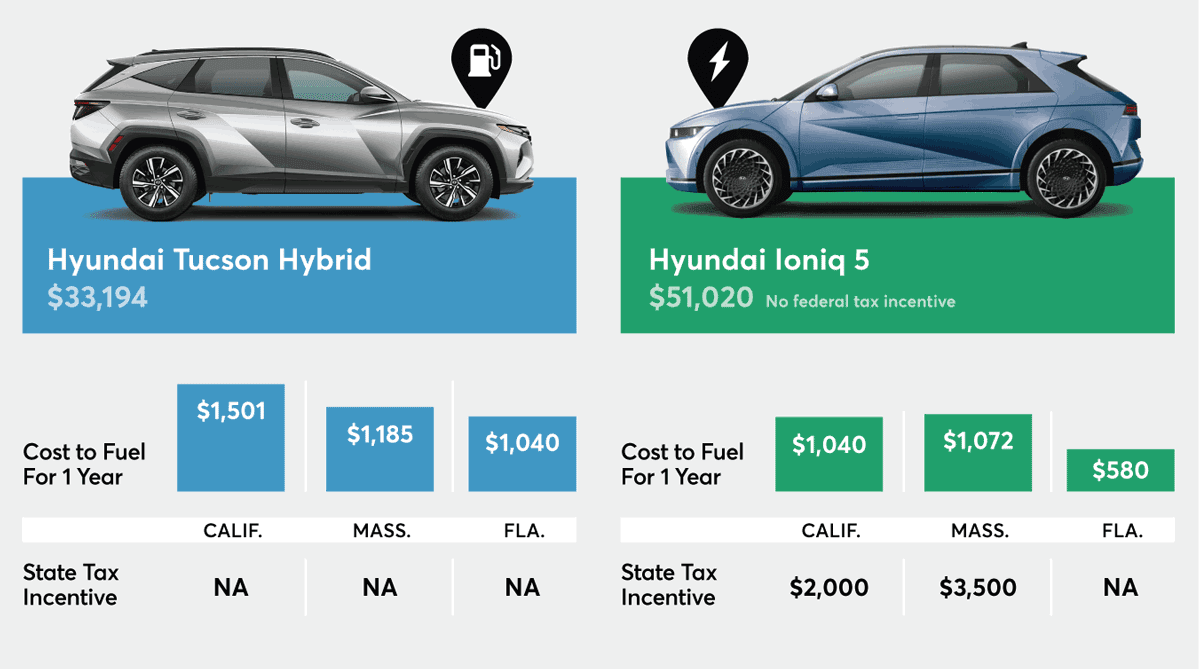
Pickup Trucks: Ford F-150 Hybrid ($69,935) vs. Ford F-150 Lightning ($80,889)
For drivers who live somewhere with high gas prices and low electricity costs, a well equipped F-150 Lightning Extended Range might save enough on fuel alone to make buying a pricier EV an easy choice. “Because pickups use so much gas, electrification can save buyers a substantial amount,” says Fisher.
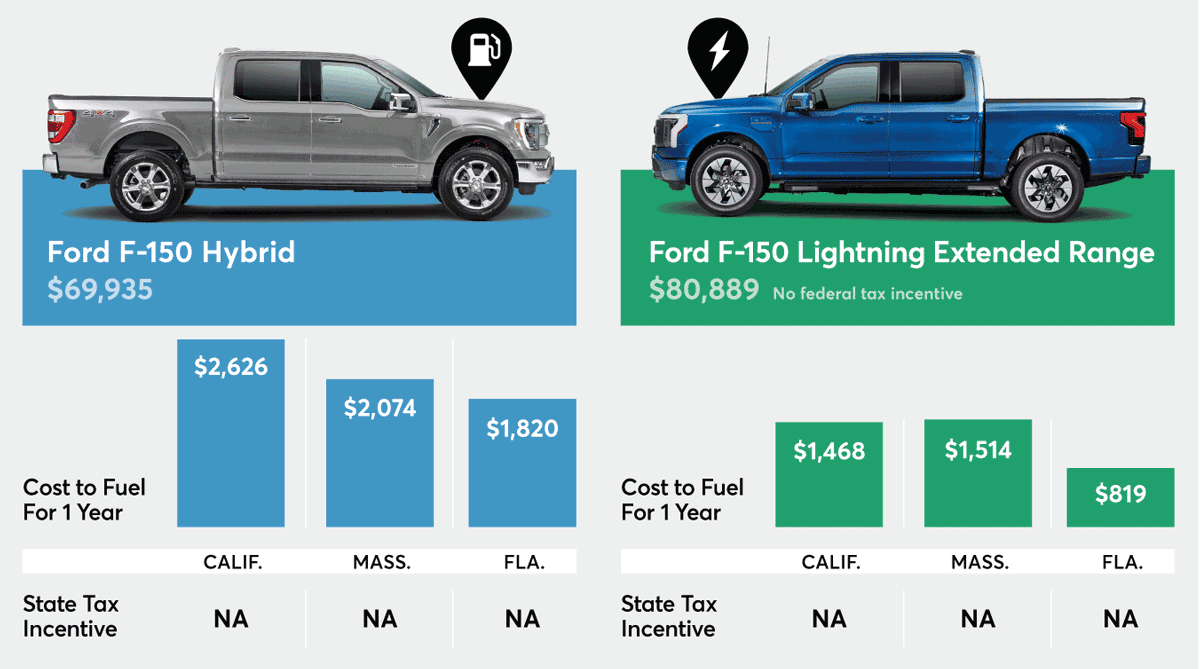
CR buys all of its test cars anonymously from dealers and does not accept free samples from automakers for any of its ratings or evaluations. CR’s testers drive a total of 500,000 miles annually in the vehicles it evaluates, which is the equivalent of circling the Earth twenty times.
For more information, visit CR.org/hybrids-evs.
Media Contacts
About Consumer Reports
Founded in 1936, CR has a mission to create a fair and just marketplace for all. Widely known for our rigorous research and testing of products and services, we also survey millions of consumers each year, report extensively on marketplace issues, and advocate for consumer rights and protections around safety as well as digital rights, financial fairness, and sustainability. CR is independent and nonprofit.
© 2026 Consumer Reports. The material above is intended for legitimate news entities only; it may not be used for advertising or promotional purposes. Consumer Reports® is an expert, independent, nonprofit organization whose mission is to work side by side with consumers to create a fairer, safer, and healthier world. We accept no advertising and pay for all the products we test. We are not beholden to any commercial interest. Our income is derived from the sale of Consumer Reports® magazine, ConsumerReports.org® and our other publications and information products, services, fees, and noncommercial contributions and grants. Our Ratings and reports are intended solely for the use of our readers. Neither the Ratings nor the reports may be used in advertising or for any other commercial purpose without our prior written permission. Consumer Reports will take all steps open to it to prevent unauthorized commercial use of its content and trademarks.